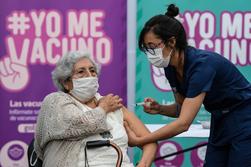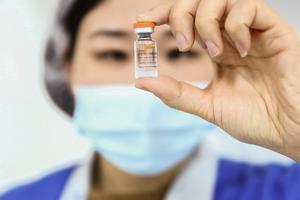 In this undated file photo, an elderly woman in Santiago, Chile, receives CoronaVac made by China's Sinovac Biotech Ltd. Chile started administering vaccines on Feb 3, including nearly 4 million doses received from China. (PHOTO / XINHUA)
In this undated file photo, an elderly woman in Santiago, Chile, receives CoronaVac made by China's Sinovac Biotech Ltd. Chile started administering vaccines on Feb 3, including nearly 4 million doses received from China. (PHOTO / XINHUA)
At Sinovac Biotech Ltd's base in Daxing district of Beijing, employees are busy manufacturing CoronaVac, the inactivated COVID-19 vaccine, in bulk.
From cell culture to packaging, a jab can be produced in just 48 days. Now the company churns out about 400,000 doses a day.
"The yearly output of our first production line has reached 500 million doses. Our second production line started operations this month, enabling the company to attain capacity to produce 1 billion doses of vaccine every year," said Yin Weidong, chairman of Nasdaq-listed Sinovac.
He said: "Ever since our first production line started operations in August, the machines ran almost 24 hours a day. Our employees worked round the clock in three shifts to meet the surging demand for vaccine."
Currently, while ensuring adequate supplies of vaccine for the domestic market, the company is exporting some quantities to countries like Brazil, Turkey, Indonesia and Chile.
On Jan 20, the Public Health Institute of Chile, called the ISP locally, approved the emergency use of Sinovac's COVID-19 vaccine. Two batches of nearly 4 million vaccine doses were delivered to the country on Jan 28 and Jan 31. According to the local government, Chile started large-scale vaccination on Feb 3.
Chinese vaccine enterprises have created more chances for themselves to know about the international markets, and are more motivated and encouraged now to export their vaccines. The whole industry has reached a new development stage, said Li Shanshan, a healthcare columnist at news website Zaker.
Similarly, the public health authorities of Brazil, Turkey and Indonesia also approved the emergency use of Sinovac's COVID-19 vaccine.
Pearson Liu, director of brand management and public relations of Sinovac, said packaged vaccines will be stored in cold-chain boxes and delivered to the airports by cold-chain trucks.
To ensure the safety of international vaccine delivery, Sinovac cooperated with Envirotainer, the world's largest temperature-controlled container and logistics provider, to deliver vaccines to destination countries. A chip is installed inside the containers, to track and manage vaccine storage temperature throughout the whole shipping process.
"The storage temperature for our vaccine is between 2 C and 8 C, which means the product needn't remelt and can be used directly," Liu said.
He said that to save on packaging and delivery costs, Sinovac exports semifinished jabs to some countries, making the importing countries fill and repackage the vaccines themselves.
In such a situation, Sinovac helps build local filling and packaging lines in the countries, to improve the production capacity and efficiency.
Data from the World Health Organization showed that currently, there were 235 vaccine candidates in the world, and 63 of them had entered the clinical trial phase. The vaccine candidates, such as the messenger ribonucleic acid (mRNA) vaccine developed by US-based Pfizer and the recombination vaccine developed by UK-based AstraZeneca, had received orders for more than 1 billion doses overseas.
ALSO READ: WHO gives AstraZeneca shot emergency clearance
China has 15 vaccine candidates entering clinical trials, with five of them already in third-stage clinical tests. Among the five candidates, the vaccines produced by Sinovac and China National Pharmaceutical Group (Sinopharm) had been approved for emergency use by more than 16 countries. The two Chinese companies received related orders and have been shipping the vaccines in an orderly manner.
According to a Xinhua report, by Jan 3, China had received vaccine orders for more than 500 million doses from at least 16 countries. For instance, the Philippines, Brazil, Chile, Turkey and Indonesia ordered 25 million, 46 million, 60 million, 50 million and nearly 100 million doses each, respectively.
 An employee shows the CoronaVac made by China's Sinovac Biotech Ltd in Daxing district of Beijing on Dec 23, 2020. (PHOTO / XINHUA)
An employee shows the CoronaVac made by China's Sinovac Biotech Ltd in Daxing district of Beijing on Dec 23, 2020. (PHOTO / XINHUA)
Li Shanshan, a healthcare columnist at news website Zaker, said that ever since COVID-19 broke out, Chinese vaccine manufacturers have been nimble in their response. Five vaccine candidates have reached the third stage of clinical tests, receiving overseas orders across Southeast Asia, Africa and the Middle East.
In the process, Chinese vaccine enterprises have created more chances for themselves to know about the international markets, and are more motivated and encouraged now to export their vaccines. The whole industry has reached a new development stage, she said.
Chen Qiaoshan, an independent medical analyst, said: "The research and development process of Chinese vaccine manufacturers has proved that the vaccine innovation capability of Chinese enterprises is as good as that of multinational corporations. With the export experience, China is also improving its international influence and credibility in the vaccine industry."
Chinese Foreign Ministry spokeswoman Hua Chunying said at a news conference in January that China has joined the WHO-led COVAX initiative to support the G20 members in promoting international cooperation on vaccines and multilateral cooperation to promote the equitable global distribution of vaccines.
According to some data, more than 40 countries are believed to have sought to import vaccines from China. "We believe that with the continuous expansion of production capacity, China will gradually increase the supply of vaccines to countries in need," she said.
Hua said that at present, Chinese companies are actively discussing cooperation with COVAX. "China is willing to contribute to the realization of vaccine accessibility and affordability in developing countries through COVAX."
Yin from Sinovac said the company's COVID-19 vaccine production is now in full swing, to ensure adequate vaccine supply domestically as well as to keep its commitment of offering vaccines as a global public good to the rest of the world.
READ MORE: Approval procedures for Sinovac jab 'stringent', 'comprehensive'
"I am an entrepreneur; I am also a scientist. What we are doing now is to lower the cost while increasing the accessibility of the vaccine, so that the vaccine made in China can be recognized by more countries and regions around the world, and protect as many people as possible," Yin said.


